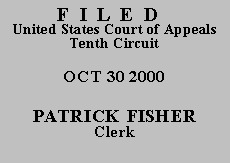

| LINDSEY K. SPRINGER,
vs.
VICKI BALOUGH; SANDRA
STOUT; JANE D. HULL; JACQUE
ALEXANDER; JOHN MOTT-SMITH |
|
Background
Mr. Springer wrote letters to the election officials of all fifty states asserting that he met the constitutional requirements to be President of the United States, and requesting that each of them place his name on their respective ballots. When the election officials in each state either rejected or ignored his request, Mr. Springer sued, alleging that their ballot access laws violated his constitutional rights under the 9th, 10th, and 14th Amendments.
Discussion
We review a motion to dismiss for lack of personal jurisdiction de novo. Soma Medical Int'l v. Standard Chartered Bank, 196 F.3d 1292, 1295 (10th Cir. 1999); Kennedy v. Freeman, 919 F.2d 126, 128 (10th Cir. 1990). In a federal question case, the federal court must determine "(1) 'whether the applicable statute potentially confers jurisdiction' by authorizing service of process on the defendant and (2)whether the exercise of jurisdiction comports with due process.'" Peay v. Bellsouth Medical Assistance Plan, 205 F.3d 1206, 1209 (10th Cir. 2000) (citation omitted). As there is no federal statute authorizing nationwide personal jurisdiction in this case, Fed. R. Civ. P. 4(k)(1)(A) refers us to the Oklahoma long-arm statute. Okla. Stat. Ann. tit. 12, § 2004(F) (West 2000).
The Oklahoma long-arm statute "permits the exercise of any jurisdiction that is consistent with the United States Constitution," collapsing the personal jurisdiction analysis into a due process inquiry. Intercon, Inc. v. Bell Atlantic Internet Solutions, Inc., 205 F.3d 1244, 1247 (10th Cir. 2000). A court can exercise personal jurisdiction over a non-resident defendant consistent with the Due Process Clause if "minimum contacts" exist between the defendant and the forum state. Id. The plaintiff bears the burden of making a prima facie showing that these standards are satisfied when personal jurisdiction is challenged under Fed. R. Civ. P. 12(b)(2). OMI Holdings, Inc. v. Royal Ins. Co. of Canada, 149 F.3d 1086, 1091 (10th Cir. 1998). The only contacts that Mr. Springer has alleged between the non-resident defendants and Oklahoma are the responses some of the Defendants sent to Mr. Springer, denying his request to be listed on the general election ballot. We deem this insufficient to provide a prima facie showing of personal jurisdiction.
A court may dismiss a complaint for failure to state a claim upon which relief can be granted. See Fed. R. Civ. P. 12 (b)(6). We review such a dismissal de novo. Joseph v. Wiles, 223 F.3d 1155, 1158 (10th Cir. 2000). While allegations in the plaintiff's complaint are presumed to be true, see Miller v. Glanz, 948 F.2d 1562, 1565 (10th Cir. 1991), "the court need accept as true only the plaintiff's well-pleaded factual contentions, not his conclusory allegations." Hall v. Bellmon, 935 F.2d 1106, 1110 (10th Cir. 1991). Therefore, a plaintiff must "set forth factual allegations, either direct or inferential, respecting each material element necessary to sustain recovery under some actionable legal theory." Gooley v. Mobil Oil Corp., 851 F.2d 513, 515 (1st Cir. 1988).
Mr. Springer has failed to establish under what legal theory he can claim judicial relief. The Supreme Court has recognized that states can place certain restrictions on elections to keep them fair, honest, and orderly. See Storer v. Brown, 415 U.S. 724, 730 (1974). Specifically in the context of ballot access in a presidential election, the Supreme Court has recognized that "the state's important regulatory interests are generally sufficient to justify reasonable, nondiscriminatory restrictions." Anderson v. Celebrezze, 460 U.S. 780, 788 (1982). See also Timmons v. Twin Cities Area New Party, 520 U.S. 351, 358 (1997) (stating the Constitution permits a state to "enact reasonable regulations of parties, elections, and ballots to reduce election- and campaign-related disorder"). Mr. Springer has failed to plead any specific facts that call into question whether any specific state requirements violate these standards.
Accordingly, we AFFIRM the judgment of the district court. All other pending motions are DENIED.
Entered for the Court
Paul J. Kelly, Jr.
Circuit Judge
*. This order and judgment is not binding precedent, except under the doctrines of law of the case, res judicata, and collateral estoppel. This court generally disfavors the citation of orders and judgments; nevertheless, an order and judgment may be cited under the terms and conditions of 10th Cir. R. 36.3.
**. After examining the briefs and the appellate record, this three-judge panel has determined unanimously that oral argument would not be of material assistance in the determination of this appeal. See Fed. R. App. P. 34(a); 10th Cir. R. 34.1 (G). The cause is therefore ordered submitted without oral argument.